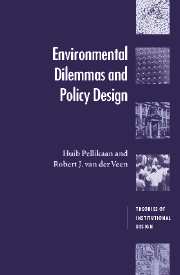Book contents
- Frontmatter
- Contents
- List of figures
- List of tables
- Preface
- Part I Background
- 1 Environmental pollution as a problem of collective action
- 2 A Dutch approach: self-regulation as a policy concept
- 3 The actor's perspective on collective action
- Part II The survey
- Part III Conclusions: theory and policy
- References
- Index
3 - The actor's perspective on collective action
Published online by Cambridge University Press: 22 September 2009
- Frontmatter
- Contents
- List of figures
- List of tables
- Preface
- Part I Background
- 1 Environmental pollution as a problem of collective action
- 2 A Dutch approach: self-regulation as a policy concept
- 3 The actor's perspective on collective action
- Part II The survey
- Part III Conclusions: theory and policy
- References
- Index
Summary
The subjectivity of the actor in rational choice theory
The Dutch policies of self-regulation discussed in the last chapter have been generally well received by the public, and we shall report our own findings on their acceptance in chapter 9. However, the question we wish to consider now is whether such policies can be expected to work at all, given what social science can tell us about rational behaviour in large groups. For this, we turn to theories of collective action.
The prevention of environmental degradation is a classical example of a public or collective good. If everyone makes a contribution, pollution will decrease considerably. A cleaner environment is a collective good from which everyone benefits. The problem arises from the fact that these benefits are free, i.e., anyone can enjoy the benefits of a cleaner environment whether or not he or she has made a contribution. According to Mancur Olson, environmental behaviour is vulnerable to the logic of free-ridership. Olson's thesis on collective action has achieved the status of a scientific law in the community of environmental researchers. This ‘law’ states that rational individuals seek to maximize their personal welfare, and will not voluntarily contribute to advance their common good, when they are members of a large group. Olson's logic implies that the answer to the question ‘can the policy of self-regulation really work?’ must be: the policy of self-regulation will never work, because no one will make a contribution.
- Type
- Chapter
- Information
- Environmental Dilemmas and Policy Design , pp. 47 - 64Publisher: Cambridge University PressPrint publication year: 2002



